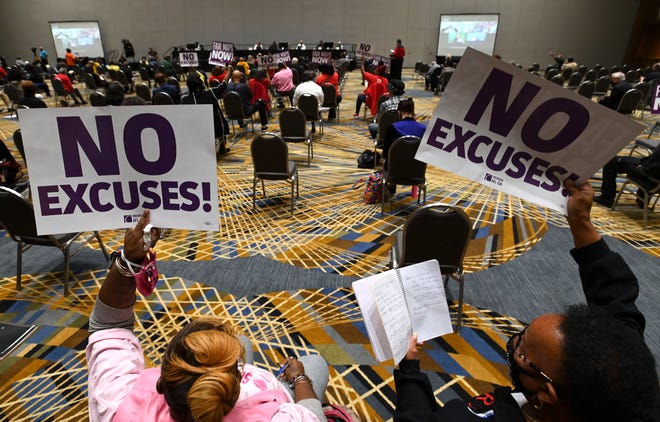Redistricting maps need more explanation to hold up in court, experts say
 Beth LeBlanc
Beth LeBlancRedistricting experts urged the panel redrawing Michigan's voting boundaries to provide additional data and rationale to support the maps they've proposed so far, arguing the information will be essential if and when the maps are challenged in court.
The comments come as Michigan's Independent Citizens Redistricting Commission moves through a series of five public hearings to get feedback on proposed draft maps they're scheduled to push through to a sort of semi-final round on Nov. 5.
Whatever maps get approved Nov. 5 will enter a 45-day public comment period starting Nov. 14 and a final vote will be taken on one state House, state Senate and Congressional district map Dec. 30. Candidates in the 2022 primary and general elections will run in the newly drawn districts.
"Not everyone has to agree with where the commission lands, but we all need to — in order to accept the maps — understand what went into drawing them," said Nancy Wang, executive director for Voters Not Politicians, the ballot committee that spearheaded the 2018 constitutional amendment that created the commission.

The commission pushed back on the critiques Friday, arguing the redistricting process so far has been "open and transparent."
"All of the data considered is listed in the draft proposed maps, which is accessible off of the home page on the website," said Edward Woods, a spokesman for the commission. "If there is additional data that needs to be considered, we welcome anyone to provide it at a public hearing or through the public comment portal."
Prior to the formation of Michigan's Independent Citizens Redistricting Commission in 2018, Michigan's voting district maps were redrawn by the majority party every 10 years — a process that critics said resulted in gerrymandered maps that benefited one party over the other.
The commission has been working for weeks to draw 22 proposed draft maps that contain districts of equal population, balanced racial representation, communities of interest and partisan fairness. But the preliminary plans have received a variety of criticisms during public hearings over the past few days.
Wang acknowledged that the current public hearing phase is the "messiest" part of the redistricting process, based on the experience of other states.
"This is when the public actually has lines to see and comment on," she said. But Wang noted the debate occurring was an important departure from past processes.
"The depth of the discussion we’re having here and we’re seeing at the public sessions is really healthy," she said.
In a Friday call with media, Wang and Matt Grossmann, director of the Institute for Public Policy and Social Research, joined some critics of the current plans, specifically related to the commission's interpretation of requirements such as the Voting Rights Act, communities of interest and partisan fairness.
The commission's maps in Metro Detroit received tough criticism Wednesday from Black residents who felt the commission's efforts to "unpack" and spread Black Detroiters across several districts diluted the Black vote and made it difficult for an African American-preferred candidate to make it through a primary.
Grossmann said the commission's decision to keep Black concentrations at about 40% — based on advice from their consultants — lacks some important data to support the decision, including past Democratic primary voting numbers.
"They are relying on a threshold with an incomplete data set," Grossmann said of the 40% benchmark. He indicated the commission could "ask more of its consultants" when it comes to the data to back up those decisions.
Commissioners should also take into consideration the feedback they receive at the public hearings, he said.
"Process is also considered in courts," Grossmann said. "If they go out to the public, they repeatedly receive feedback from African American leaders that these districts are not complying with the Voting Rights Act, then that in itself is an issue for the commission. So it is necessary for the commission to show some responsiveness to the commentary that they’re receiving.”
Both Wang and Grossmann expressed frustration with some interpretations of a community of interest, which ranks No. 3 on the list of priorities the commission must consider.

Wang noted communities of interest are largely based on cultural, economic or historical associations. But several public commentators have urged commissioners to keep counties whole — on the premise that the borders represent a community of interest — and complained when counties such as Ottawa County were split up among several districts. Following county and municipal boundaries is a requirement of the new constitutional language but lower in priority than communities of interest.
"Some of the confusion that we’ve seen have to do with whether counties are communities of interest," Wang said. Counties are not communities of interest in the same way that cultural or economic groups are, she said.
"I would like to see again an explanation from the commission for how it's treating those two things. In our opinion, in drafting the amendment, the purpose was to draw on the history of Michigan where politicians were using county lines as an excuse to gerrymander."
Both Grossmann and Wang pushed for better partisan fairness, while acknowledging there was sometimes a difficult balance struck between compliance with the Voting Rights Act and partisan fairness.
The seat share should reflect the vote share, said Wang, referring to Republicans' recent retention of the majority in the state House and Senate despite losing the statewide vote to Democrats.
"There is a kind of push and pull between VRA and partisan fairness, I get that," Wang said. "We continue to assert though that the commission here, even given the geography of Michigan, can meet all of the criteria even partisan fairness.”
eleblanc@detroitnews.com